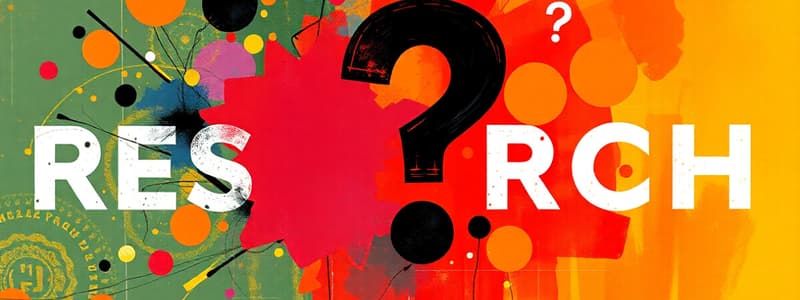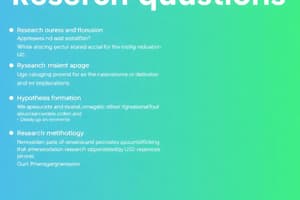Podcast
Questions and Answers
When defining a research problem, which of the following represents the correct sequence?
When defining a research problem, which of the following represents the correct sequence?
- Research problem -> what is known -> knowledge gap identified.
- What is known -> knowledge gap identified -> research problem. (correct)
- What is known -> research problem -> knowledge gap identified.
- Knowledge gap identified -> what is known -> research problem.
A research problem is best described as:
A research problem is best described as:
- A statement of the researcher's personal beliefs.
- An area of concern or a gap in existing knowledge that points to the need for further investigation. (correct)
- A broad topic of interest with lots of existing knowledge.
- A hypothesis that has already been proven.
Which of the following phrases is LEAST suitable for defining a research problem?
Which of the following phrases is LEAST suitable for defining a research problem?
- An area of concern or a gap in existing knowledge.
- Identifying variables in the problem situation and defining them adequately. (correct)
- "No research has dealt with..."
- "Little is known about..."
What is the key characteristic of a well-defined research question?
What is the key characteristic of a well-defined research question?
Which of the following is NOT a recommended method for formulating a research question?
Which of the following is NOT a recommended method for formulating a research question?
What type of research question is, 'Is there a relationship between exercise and heart rate variability in adults?'
What type of research question is, 'Is there a relationship between exercise and heart rate variability in adults?'
According to the FINER criteria, what does the 'E' stand for?
According to the FINER criteria, what does the 'E' stand for?
Which of the following best describes a targeted problem statement?
Which of the following best describes a targeted problem statement?
What is the main drawback of many research proposals related to the research question?
What is the main drawback of many research proposals related to the research question?
Which of the following elements is included in the hierarchy to be considered while framing a research problem?
Which of the following elements is included in the hierarchy to be considered while framing a research problem?
The aim of the work in broad terms (over a longer time period) is best described as:
The aim of the work in broad terms (over a longer time period) is best described as:
According to the SMART criteria for research objectives, what does the 'M' stand for?
According to the SMART criteria for research objectives, what does the 'M' stand for?
Which of the following is characteristic of research objectives?
Which of the following is characteristic of research objectives?
What is the purpose of stating the research objectives at the beginning of a study?
What is the purpose of stating the research objectives at the beginning of a study?
In the context of research, what is a hypothesis?
In the context of research, what is a hypothesis?
Which statement best describes 'null hypothesis'?
Which statement best describes 'null hypothesis'?
In a controlled experiment, what is the purpose of the 'control group'?
In a controlled experiment, what is the purpose of the 'control group'?
What is an independent variable?
What is an independent variable?
What refers to the reliability of results, if you ran the experiment again, would you get the same results?
What refers to the reliability of results, if you ran the experiment again, would you get the same results?
What is the advantage of within-subjects experimental design?
What is the advantage of within-subjects experimental design?
Flashcards
Define the research problem
Define the research problem
The initial step in research; often the most challenging and crucial part
Research problem
Research problem
An area of concern or gap in existing knowledge that needs further investigation.
Purpose of a study
Purpose of a study
Expressing the study's purpose via questions, hypotheses, or aims.
Questions or hypotheses
Questions or hypotheses
Signup and view all the flashcards
Specific research question
Specific research question
Signup and view all the flashcards
Format of research question
Format of research question
Signup and view all the flashcards
Formulate a Research Question
Formulate a Research Question
Signup and view all the flashcards
Problem statement
Problem statement
Signup and view all the flashcards
FINER Criteria
FINER Criteria
Signup and view all the flashcards
Objectives
Objectives
Signup and view all the flashcards
Goals
Goals
Signup and view all the flashcards
Research Objectives
Research Objectives
Signup and view all the flashcards
Research hypothesis
Research hypothesis
Signup and view all the flashcards
Independent variable
Independent variable
Signup and view all the flashcards
Dependent variable
Dependent variable
Signup and view all the flashcards
Null hypothesis
Null hypothesis
Signup and view all the flashcards
Null hypothesis states
Null hypothesis states
Signup and view all the flashcards
Between-subjects
Between-subjects
Signup and view all the flashcards
Controlled experiment
Controlled experiment
Signup and view all the flashcards
One-tailed test
One-tailed test
Signup and view all the flashcards
Study Notes
Research Methodology Lecture Slide Series-1: Research Question, Hypothesis, Objectives
- Study purpose expression: questions, hypotheses, aims/objectives, or a mix
- Question or hypothesis use depends on study, design, audience, and reviewer tastes
Defining The Research Problem
- Defining the research problem is the first and the most difficult and important step
- Known facts are facts that are already known
- "What are not known?" indicates knowledge gap
- Knowledge gap leads to research problem
- Present the research problem in question form
- Research problem emerges from an area of concern or a knowledge gap
Research Problems
- Need further understanding and investigation
- Stating the problem in specific terms
- Identifying and adequately defining variables helps define the problem
- Important variables: research questions created from variable relationships
- Problems shouldn't be too general
Research Question
- Decisions depend on well-defined, specific research questions
- Research questions help with data type collection and analysis
- Research questions should be one sentence
- Research questions should be clear, unambiguous, and specific
- Research questions often begin with a general concern
- Examples: women using hormones to prevent bone loss
- Narrowing research questions to be measurable
Research Question Examples
- Is estrogen intake linked to reduced osteoporosis risk in women aged 60+?
- Can vegetarian diets lower cholesterol in cardiovascular disease patients?
- Can diabetes education help type 2 diabetics manage blood glucose?
- Inspired by people/practices, seminars, conferences, symposia can formulate research questions
- Literature review, collab with colleagues, review local, national, and regional issues can formulate research questions as well
Sample Research Questions
- Interest: Can diabetic patients be taught to control their blood glucose levels?
- Research Question: Can a structured intensive instruction help adult patients with Type 2 diabetes control their blood glucose levels compared to patients receiving standard instructions?
- Interest in women taking hormones to prevent bone loss
- Research Question: Does taking estrogen after menopause reduce risk of bone density loss in women over 60, compared to women not taking estrogen?
Research Question Types
- Descriptive questions: describing or exploring a group
- Relational questions: finding associations between 2 variables in a group
- Comparable questions: finding associations between 2+ variables in 2+ groups (causality/prediction/intervention)
Research Question Examples
- What is the biostatistics knowledge level among 3rd-year medical students?
- Is drug A superior to drug B in managing hepatic failure in cirrhosis patients?
- Is alcoholism related to cirrhotic liver development?
FINER criteria
- Feasible: adequate subjects, expertise, manageable in scope, affordable time/money
- Interesting: getting answer intrigues investigators/peers/community
- Novel: confirms, refutes, or extends previous findings
- Ethical: IRB approval possible
- Relevant: to scientific knowledge, future research, clinical/health policy
- Drawback: Research question is not specific enough
Problem Definition
- Problem statement includes a claim that outlines and briefly explains the problem
- Also briefly addresses the research question
- Transforming generalized problems into targeted, well-defined ones
- Problem statements address knowledge gaps, past work, and need for research
- Researcher needs to solve problems
- Problem statement explains what questions are asked
- Statements form the foundation for development of research proposals (objectives, methodology, etc.)
Research Problem v. Question
-
School X teachers lack skills in guiding gifted students.
- How can School X teachers better guide gifted children?
-
People under 30 are increasingly engaged in the “gig economy”
- What main factors influence young people’s decision to engage in the gig economy?
- What do workers perceive as its advantages and disadvantages?
- Do age and education level have an effect on how people experience this type of work?
Research Questions
- "What impact does social media have on people’s minds?" is not defined well enough because it is not specific enough
- Concepts need to be defined.
- Quantitative and Qualitative are needed to answer if daily use of Twitter affects the attention span of under 16 year olds
Economic Social Factors
- Has here been an increase in homelessness in San Francisco in the past ten years?
- How have economic, political and social factors affected patterns of homelessness in San Francisco over the past ten years?
Goals and Objectives
- Goals define the work aim in broad terms over a longer period.
- Objectives relate directly to the question and are more specific.
- Primary objectives → achieved
- Secondary Objectives → on the way
Research Objectives
- Objectives are stated to guide the process of formulating research questions and hypothesis; thus, they should be stated at the very beginning of the study
- Objectives help in the prioritization process
- Objectives enable readers/consumers to judge investigator achievement
Research Objectives qualities
- Closely related to the question
- Covering all aspects of the problem
- Very specific
- Ordered in a logical sequence
- Stated in action verbs that could be evaluated (e.g. to describe, to identify, to measure, to compare, etc.)
- Achievable, taking into consideration available resources and time
- Mutually exclusive, with no repetitions or overlaps
- Should be Specific, Measurable, Achievable, Relevant, Time bound
Objective Examples
- SNP markers association with obesity and hypertension phenotypes
- Assessment of general population knowledge and attitude towards organ donation
- Risk factors identification for Type-II diabetes
Goals/Aims vs. Objectives
- Goals/Aims broad & visionary, objectives are narrow & precise
- Goals/Aims general intentions, objectives tangible and concrete
- Goals/Aims abstract, objectives measurable
Characteristics of objectives
- Should be stated as outcomes, not a process
- Objectives specify the result of an activity
- Collectively test hypothesis aspects
- Should be two to five and flow logically
- Must not absolutely depend on earlier outcome
Research Objectives
- Developing/evaluating smartwatch stress detection/management system for student stress reduction and well-being
- Objective: Developing smartwatch system for real-time stress detection using indicators
- Objective: Evaluating smart watch accuracy for stress detection with assessments
- Design and implement personalized stress management interventions within the smartwatch system
- Overall objective narrower: To determine the cause of environmentally linked cleft palate (leap)
- Specific Objective is narrowest To determine the effect of herbicide "X" on the occurrence of cleft palate (leap) syndrome
Hypothesis
- States in measurable form what the researcher is investigating
- Can be prediction of a relationship between variables
- Statement is the problem translated into a precise, clear response expectation
- Educated guess about how things work
- Statement predicting relationships between variables
Hypothesis Formulation
- Identify the problem in specific terms.
- Identify/define problem variables
- Generate tentative, variables/problem solutions
Example Hypothesis
- "If I do this, then this will happen."
- Fill in the blanks with the appropriate information from your own experiment
- "If soil temperatures rise, then plant growth will increase."
- This study wants to study the effect of soil temperature on plant growth
Hypothesis example
- Smartwatch example:
- Smartwatch-Based Stress Diagnosis and Management Among University Students.
- "H1" smartwatch accurately detects stress levels
- "H2" smartwatch stress is comparable to traditional
- "H3" Smartwatch based significantly reduces stress levels
Controlled Experiment
- Compares experimental and control samples
- Practically identical control samples to test samples, with one aspect being experimented on
- Independent variables manipulate
- Dependent variable measure
Independent vs Dependent Variables
- Independent: Condition being manipulated; not dependent on user action, time of class, interface style
- Dependent: What is being measured; task completion time, accuracy, recall, emotional variables
- For example, “Having Vitamin C increases lifespan."
- Independent Vitamin C or placebo
- Dependent Lifespan
Experiments
- Independent you manipulate
- Dependent you measure
- Reliability
- Generalizability applies to other people as well
- An example to think about is that, Jane wants to determine the best place she can grow plant. She puts one on her balcony and one by the kitchen window. Which is the INDEPENDENT VARIABLE?
- The place of the plant is the independent variable
- For another example, Jack wanted to see how high an ice cube would float in different temperatures of water. Which is the DEPENDENT VARIABLE?
- The height of the ice cube is the dependent variable
Hypothesis Testing
- Experiments should show if the hypothesis is correct
Process Controlled
- Attribute of user behavior
Experiemtnal Design
- Choose the hypothesis,clarify the independent and dependent variables
- Choose which method you will use (Between subject or within subject)
Studying That Suits You
Use AI to generate personalized quizzes and flashcards to suit your learning preferences.




